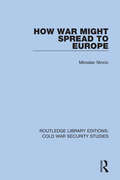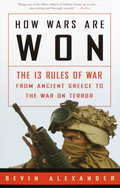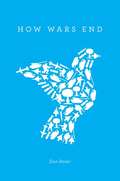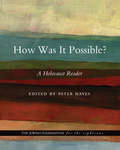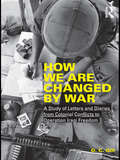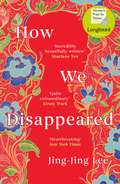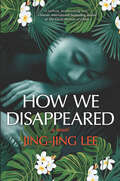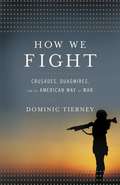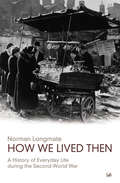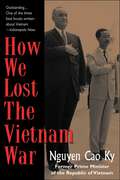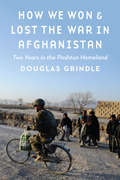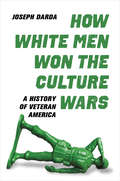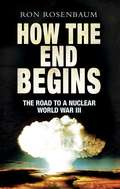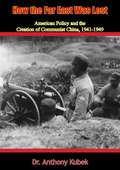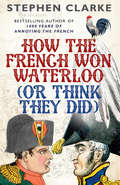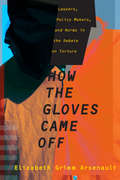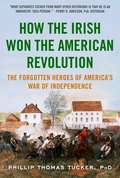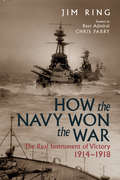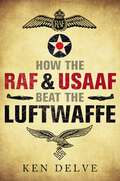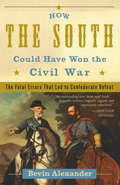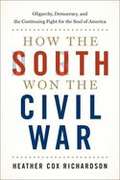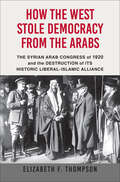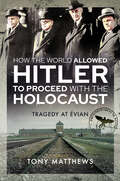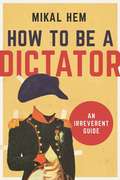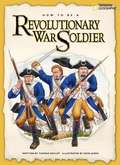- Table View
- List View
How War Might Spread to Europe (Routledge Library Editions: Cold War Security Studies #27)
by Miroslav NincicThis book, first published in 1985, examines the Cold War risks of superpower confrontations, mainly in the Third World, resulting in war in Europe. European security is usually analysed in the context of East-West relations in Europe, where though tensions often ran high, actual war seemed remote. The risks of war were much greater in other parts of the world, where the United States and the Soviet Union confronted each other using proxies. This book analyses these proxy confrontations, and the risks that they posed to the security of Europe.
How Wars Are Won: The 13 Rules of War--from Ancient Greece to the War on Terror
by Bevin AlexanderFrom ancient Greece to the war on terror, the author of the acclaimed "How Hitler Could Have Won World War II" identifies the 13 rules of war that have determined victory and defeat from ancient times through the 21st century.
How Wars End
by Dan ReiterThe author helps solve some of the most enduring puzzles in military history, and argues that two central factors shape war-termination decision making: information about the balance of power and the resolve of one's enemy.
How Was It Possible?: A Holocaust Reader
by Peter HayesAs the Holocaust passes out of living memory, future generations will no longer come face-to-face with Holocaust survivors. But the lessons of that terrible period in history are too important to let slip past. How Was It Possible?, edited and introduced by Peter Hayes, provides teachers and students with a comprehensive resource about the Nazi persecution of Jews. Deliberately resisting the reflexive urge to dismiss the topic as too horrible to be understood intellectually or emotionally, the anthology sets out to provide answers to questions that may otherwise defy comprehension. This anthology is organized around key issues of the Holocaust, from the historical context for antisemitism to the impediments to escaping Nazi Germany, and from the logistics of the death camps and the carrying out of genocide to the subsequent struggles of the displaced survivors in the aftermath. Prepared in cooperation with the Jewish Foundation for the Righteous, this anthology includes contributions from such luminaries as Jean Ancel, Saul Friedlander, Tony Judt, Alan Kraut, Primo Levi, Robert Proctor, Richard Rhodes, Timothy Snyder, and Susan Zuccotti. Taken together, the selections make the ineffable fathomable and demystify the barbarism underlying the tragedy, inviting readers to learn precisely how the Holocaust was, in fact, possible.
How We Are Changed by War: A Study of Letters and Diaries from Colonial Conflicts to Operation Iraqi Freedom
by D.C. GillThe prolonged conflict in Iraq has shown us war’s transformative effect. Civilians rivet themselves to events happening halfway around the world, while young soldiers return home from battlefields, coping with the memories of those events. How We Are Changed by War examines our sense of ourselves through the medium of diaries and wartime correspondence, beginning with the colonists of the early seventeenth century, and ending with the diaries and letters from Iraqi war vets. The book tracks the effects of war in private writings regardless of the narrator’s historical era allowing the writers to ‘speak’ to each other across time to reveal a profound commonality of cultural experience. Finally, interpreting the narratives by how the writers conveyed the content adds a richer layer of meaning through the lenses of psychology and literary criticism, providing a model for any society to examine itself through the medium of its members’ informal writings.
How We Disappeared
by Jing-Jing LeeThe heart-rending story of survival and endurance in Japanese-occupied Singapore Singapore, 1942. As Japanese troops sweep down Malaysia and into Singapore, a village is ransacked, leaving only three survivors, one of them a tiny child. In a neighbouring village, seventeen-year-old Wang Di is bundled into the back of a troop carrier and shipped off to a Japanese military brothel. After sixty years of silence, what she saw and experienced there still haunts her. And in the year 2000, twelve-year-old Kevin is sitting beside his ailing grandmother when he overhears a mumbled confession. He sets out to discover the truth, wherever it might lead, setting in motion a chain of events he could never have foreseen. Weaving together two timelines and two very big secrets, this evocative, profoundly moving and utterly dazzling debut opens a window on a little-known period of history, and heralds the arrival of a thrilling new literary star.
How We Disappeared: A Novel
by Jing-Jing LeeA twenty-first–century twelve-year-old seeks the truth behind his grandmother’s trauma in this moving novel of family, love, memory, and the toll of war.Singapore, 1942. As Japanese troops sweep down Malaysia and into Singapore, a village is ransacked, leaving only two survivors and one tiny child.In a neighboring village, seventeen-year-old Wang Di is strapped into the back of a troop carrier and shipped off to a Japanese military brothel where she is forced into sexual slavery as a “comfort woman.” After sixty years of silence, what she saw and experienced still haunts her.In the year 2000, twelve-year-old Kevin is sitting beside his ailing grandmother when he overhears a mumbled confession. He sets out to discover the truth, wherever it might lead, setting in motion a chain of events he never could have foreseen.Weaving together two timelines and two very big secrets, this stunning debut opens a window on a little-known period of history, revealing the strength and bravery shown by numerous women in the face of terrible cruelty. Drawing in part on her family’s experiences, Jing-Jing Lee has crafted a profoundly moving, unforgettable novel about human resilience, the bonds of family and the courage it takes to confront the past.Perfect for fans of Pachinko and We Were the Lucky Ones.Praise for How We DisappearedA Library Journal Emerging Stars Pick“This is a brilliant, heart-breaking story with an unforgettable image of how women were silenced and disappeared by both war and culture.” —Xinran, author of The Good Women of China“An exquisite mystery, an enthralling novel. Equally touching and intriguing.” —Eoin Dempsey, author of White Rose, Black Forest“A beautifully written, suspenseful story of redemption and healing.” —Booklist, starred review“A . . . story about memory, trauma and ultimately love, How We Disappeared explores the impact of the Japanese invasion of Singapore on the local people, in particular on the hellishly misnamed “Comfort Women.”“ —New York Times
How We Fight: Crusades, Quagmires, and the American Way of War
by Dominic TierneyAmericans love war. We've never run from a fight. Our triumphs from the American Revolution to World War II define who we are as a nation and a people. Americans hate war. Our leaders rush us into conflicts without knowing the facts or understanding the consequences. Korea, Vietnam, and now Iraq and Afghanistan define who we are as a nation and a people. How We Fight explores the extraordinary doublemindedness with which Americans approach war, and reveals the opposing mindsets that have governed our responses throughout history: the "crusade" tradition-our grand quests to defend democratic values and overthrow tyrants--and the "quagmire" tradition--our resistance to the work of nation-building and its inevitable cost in dollars and American lives. How can one nation be so split? Studying conflicts from the Civil War to the present, Dominic Tierney has created a secret history of American foreign policy and a frank and insightful look at how Americans respond to the ultimate challenge. And he shows how success is possible. His innovative model for tackling the challenges of modern war can mean longstanding victory in Iraq and Afghanistan, by rediscovering a lost American warrior tradition.
How We Lived Then: History of Everyday Life During the Second World War, A
by Norman LongmateAlthough nearly 90% of the population of Great Britain remained civilians throughout the war, or for a large part of it, their story has so far largely gone untold. In contrast with the thousands of books on military operations, barely any have concerned themselves with the individual's experience. The problems of the ordinary family are barely ever mentioned - food rationing, clothes rationing, the black-out and air raids get little space, and everyday shortages almost none at all. This book is an attempt to redress the balance; to tell the civilian's story largely through their own recollections and in their own words.
How We Lost the Vietnam War
by Nguyen Cao KyNguyen Cao Ky served as South Vietnam's prime minister and its vice president during the years of the Vietnam War's escalation, and of subsequent criticism of the war from the U. S. His memoir provides an insider's look at the disputes and corruption within the government of South Vietnam and the diplomatic struggles with the U. S. during this time. Ky, who was also a military pilot and held the rank of marshal, gives insight into the South Vietnamese military as well, criticizing inaccurate reporting on the war and drawing attention to stories that journalists avoided. Assessing the U. S. ambassadors Bunker and Martin and the role played by foreign aid, Nguyen paint an eye-opening picture of how American politics and elections had a profound effect upon U. S. allies.
How We Won and Lost the War in Afghanistan: Two Years in the Pashtun Homeland
by Douglas GrindleDouglas Grindle provides a firsthand account of how the war in Afghanistan was won in a rural district south of Kandahar City and how the newly created peace slipped away when vital resources failed to materialize and the United States headed for the exit. By placing the reader at the heart of the American counterinsurgency effort, Grindle reveals little-known incidents, including the failure of expensive aid programs to target local needs, the slow throttling of local government as official funds failed to reach the districts, and the United States’ inexplicable failure to empower the Afghan local officials even after they succeeded in bringing the people onto their side. Grindle presents the side of the hard-working Afghans who won the war and expresses what they really thought of the U.S. military and its decisions. Written by a former field officer for the U.S. Agency for International Development, this story of dashed hopes and missed opportunities details how America’s desire to leave the war behind ultimately overshadowed its desire to sustain victory.
How White Men Won the Culture Wars: A History of Veteran America
by Joseph DardaReuniting white America after Vietnam. "If war among the whites brought peace and liberty to the blacks," Frederick Douglass asked in 1875, peering into the nation’s future, "what will peace among the whites bring?" The answer then and now, after civil war and civil rights: a white reunion disguised as a veterans’ reunion. How White Men Won the Culture Wars shows how a broad contingent of white men––conservative and liberal, hawk and dove, vet and nonvet––transformed the Vietnam War into a staging ground for a post–civil rights white racial reconciliation. Conservatives could celebrate white vets as deracinated embodiments of the nation. Liberals could treat them as minoritized heroes whose voices must be heard. Erasing Americans of color, Southeast Asians, and women from the war, white men could agree, after civil rights and feminism, that they had suffered and deserved more. From the POW/MIA and veterans’ mental health movements to Rambo and "Born in the U.S.A.," they remade their racial identities for an age of color blindness and multiculturalism in the image of the Vietnam vet. No one wins in a culture war—except, Joseph Darda argues, white men dressed in army green.
How the End Begins: The Road to a Nuclear World War III
by Ron RosenbaumEach chapter of the How the World Ends deconstructs the dangers we face. Rosenbaum begins by showing all the ways the post-Cold War order that tried to impose a set of rules of averting a nuclear mistake has fallen apart. In chapter 2, he describes the journey of one Bruce Blair, once a missile launcher, whose experience inside the nuclear establishment left him alarmed about its vulnerabilities. Chapter 3 looks at nuclear war from the Russian side, using the architect of that nation's early warning system as a focus. Chapter 4 looks at how the Bush Administration helped pushed the world closer to a nuclear conflict by rewriting the rules of deterrence. Chapter 5 describes all the ways the international incidents we have seen - Georgia, the Israeli raid on Syria, the Iranian moves - are evidence that some governments have shown a willingness to move closer to the brink of a conflict involving nuclear weapons. The rest of the book looks at the broader nuclear issues facing the world in the 21st century: What is deterrence? Who can claim to have it? How many nuclear weapons can we live with? Is zero really possible? In other words: Can we undream the nightmare?
How the Far East Was Lost: American Policy and the Creation of Communist China, 1941-1949
by Dr Anthony KubekThe Far Eastern policy pursued during the Roosevelt-Truman administrations has long been the subject of spirited controversy among historians. This volume, first published in 1963, is the result of seven years of intensive research into a mass of documentary data dealing with the Communist conquest of China.“Professor Kubek discusses with unusual candor and clear vision the many mistakes of the Roosevelt and Truman Administrations with reference to the Far East. There are new data and fresh interpretations that lend additional evidence to support the contentions of earlier writers that the diplomacy of the Administrations of Roosevelt and Truman was disastrous in the extreme. The strange actions of General Marshall in China, and his blind policy while Secretary of State, were chief factors in the loss of China to the Communists. In a noteworthy chapter that all Americans should read, Professor Kubek traces in damning detail the tragic role that Marshall played in the fall of Nationalist China.“This is a volume that will earn the sharpest criticisms of the motley hordes that crowded the Roosevelt and Truman bandwagons, but it is a must book for any American who wants to know why the present sawdust Caesar, Khrushchev, can insult at will the President of the United States and can hurl continual threats to “bury” all Americans. Soviet militate might is the direct product of billions of Democratic Lend-Lease aid, coddling of Communists in high places in the American Government, and failure to understand the basic drives of world Communism. Never before in our history was Presidential leadership so devoid of vision, and never before had the mistakes of our Chief Executives been so fraught with peril to our nation. Read this book and then begin to worry about how Americans will fare in the next decade.”—Charles Callan Tansill, Professor Emeritus of Diplomatic History, Georgetown University (Foreword)
How the French Won Waterloo - or Think They Did
by Stephen ClarkePublished in the 200th Anniversary year of the Battle of Waterloo a witty look at how the French still think they won, by Stephen Clarke, author of 1000 Years of Annoying the French and A Year in the Merde.Two centuries after the Battle of Waterloo, the French are still in denial.If Napoleon lost on 18 June 1815 (and that's a big 'if'), then whoever rules the universe got it wrong. As soon as the cannons stopped firing, French historians began re-writing history. The Duke of Wellington was beaten, they say, and then the Prussians jumped into the boxing ring, breaking all the rules of battle. In essence, the French cannot bear the idea that Napoleon, their greatest-ever national hero, was in any way a loser. Especially not against the traditional enemy – les Anglais.Stephen Clarke has studied the French version of Waterloo, as told by battle veterans, novelists, historians – right up to today's politicians, and he has uncovered a story of pain, patriotism and sheer perversion ...
How the Gloves Came Off: Lawyers, Policy Makers, and Norms in the Debate on Torture (Columbia Studies in Terrorism and Irregular Warfare)
by Elizabeth Grimm ArsenaultThe treatment of detainees at Abu Ghraib prison, Guantánamo Bay, and far-flung CIA "black sites" after the attacks of 9/11 included cruelty that defied legal and normative prohibitions in U.S. and international law. The antitorture stance of the United States was brushed aside. Since then, the guarantee of American civil liberties and due process for POWs and detainees has grown muddled, threatening the norms that sustain modern democracies. How the Gloves Came Off considers the legal and political arguments that led to this standoff between civility and chaos and their significant consequences for the strategic interests and standing of the United States. Unpacking the rhetoric surrounding the push for unitary executive action in wartime, How the Gloves Came Off traces the unmaking of the consensus against torture. It implicates U.S. military commanders, high-level government administrators, lawyers, and policy makers from both parties, exposing the ease with which powerful actors manipulated ambiguities to strip detainees of their humanity. By targeting the language and logic that made torture thinkable, this book shows how future decision makers can craft an effective counternarrative and set a new course for U.S. policy toward POWs and detainees. Whether leaders use their influence to reinforce a prohibition of cruelty to prisoners or continue to undermine long-standing international law will determine whether the United States retains a core component of its founding identity.
How the Irish Won the American Revolution: A New Look at the Forgotten Heroes of America?s War of Independence
by Phillip Thomas TuckerWhen the Continental Congress decided to declare independence from the British empire in 1776, ten percent of the population of their fledgling country were from Ireland. By 1790, close to 500,000 Irish citizens had immigrated to America. They were was very active in the American Revolution, both on the battlefields and off, and yet their stories are not well known. The important contributions of the Irish on military, political, and economic levels have been long overlooked and ignored by generations of historians. However, new evidence has revealed that Washington’s Continental Army consisted of a far larger percentage of Irish soldiers than previously thought--between 40 and 50 percent--who fought during some of the most important battles of the American Revolution. Romanticized versions of this historical period tend to focus on the upper class figures that had the biggest roles in America’s struggle for liberty. But these adaptations neglect the impact of European and Irish ideals as well as citizens on the formation of the revolution. Irish contributors such as John Barry, the colonies’ foremost naval officer; Henry Knox, an artillery officer and future Secretary of War; Richard Montgomery, America’s first war hero and martyr; and Charles Thomson, a radical organizer and Secretary to the Continental Congress were all instrumental in carrying out the vision for a free country. Without their timely and disproportionate assistance, America almost certainly would have lost the desperate fight for its existence. Skyhorse Publishing, as well as our Arcade imprint, are proud to publish a broad range of books for readers interested in history--books about World War II, the Third Reich, Hitler and his henchmen, the JFK assassination, conspiracies, the American Civil War, the American Revolution, gladiators, Vikings, ancient Rome, medieval times, the old West, and much more. While not every title we publish becomes a New York Times bestseller or a national bestseller, we are committed to books on subjects that are sometimes overlooked and to authors whose work might not otherwise find a home.
How the Navy Won the War: The Real Instrument of Victory, 1914–1918
by Jim RingVerdun, the Somme, Tannenberg and Passchendaele. These epics of destruction and futility are such bywords for the First World War that – Jutland apart – we forget the role played by sea power in the war to end war. The great global conflict is too often narrowed to the fields of Flanders and the plains of Picardy. Now, award-winning biographer and naval historian Jim Ring has revisited the story to redress the balance. He emphasises how Great Britain, ‘the great Amphibian in Churchills words, was able to move its army anywhere in the world. The Navys very existence deterred any attempt at invasion, and its great ships kept the German High Sea fleet at bay; lastly, the Navy gradually starved the Kaisers nation of war materiel and food. Choosing fourteen turning-points of the war, he explores the relative contributions made by land and sea power to the eventual outcome of the conflict in 1918. For example, the abandonment of the Imperial German Navys ambition for a decisive naval surface battle was at least as important as Jutland itself, while Lloyd Georges imposition of the convoy system on, it must be said, a reluctant Admiralty turned the battle against the U-boats; the mine and the submarine altered the course of war as much or more so than the tank. The book is also a study of character as well as of action, of decision-making as much as the sweep of battle, and his critique of the warlords of both the Entente and the Central Powers – of Ludendorff and Churchill, of Haig, Kitchener and Foch, of Fisher, Jellicoe, Beatty and Scheer – is refreshing, his conclusions surprising. ‘The Great War was fought on land but won at sea. Not so, says Ring, but much closer to the truth than we tend to believe. A century after the catastrophic events of the Great War, in the midst of a time at which the country is once again pondering its identity, it is worth reciting the words of John Keegan: ‘No Britain of my generation, raised on food fought through the U-boat packs in the battle of the Atlantic can ever ignore the narrowness of the margin by which sea power separates survival from starvation in the islands he inhabits. The Royal Navy was key to the survival of Great Britain and to eventual victory in 1918. Written with passion and verve, this book offers a very different way of looking at the conflict – if you think you understand the Great War, think again.
How the RAF & USAAF Beat the Luftwaffe
by Ken Delve"The Luftwaffe had to be used in a decisive way in the Battle of Britain as a means of conducting total air war. Its size, technical equipment and the means at its disposal precluded the Luftwaffe from fulfilling this mission." - Adolf Galland How did the RAF beat the Luftwaffe during the Second World War? Was it actually the fact that they did not lose which later enabled them to claim victory – a victory that would have been impossible without the participation of the Americans from early 1943? This groundbreaking study looks at the main campaigns in which the RAF – and later the Allies – faced the Luftwaffe. Critically acclaimed writer Ken Delve argues that by the latter part of 1942 the Luftwaffe was no longer a decisive strategic or even tactical weapon. The Luftwaffe was remarkably resilient, but it was on a continual slide to ultimate destruction. Its demise is deconstructed according to defective strategic planning from the inception of the Luftwaffe; its failure to provide decisive results over Britain in 1940 and over the Mediterranean and Desert in 1941–1942; and its failure to defend the Reich and the occupied countries against the RAF and, later, combined Allied bomber offensive. Delve studies numerous aspects to these failures, from equipment (aircraft and weapons) to tactics, leadership (political and military), logistics, morale and others.
How the South Could Have Won the Civil War: The Fatal Errors That Led to Confederate Defeat
by Bevin AlexanderAlexander posits the idea that the South could have won the Civil War given some tactical and strategic changes and better communication among the generals, rather than differing views about how to fight the war. He discusses how Jefferson Davis, Robert E. Lee, and Thomas "Stonewall" Jackson disagreed on strategy, the turning point battle that was never necessary, how the Confederate army never implemented its strategy to negate the Union's advantages in manpower and weaponry, how Abraham Lincoln saw the Union's problems better than the Confederacy's leaders, and how the South failed to learn from the lessons of its 1863 victory at Chancellorsville. Among the battles examined are those at Fredericksburg, Antietam, Gettsyburg, and Appomattox. Alexander is the author several books on military history, including Lost Victories. Annotation ©2008 Book News, Inc. , Portland, OR (booknews. com)
How the South Won the Civil War: Oligarchy, Democracy, and the Continuing Fight for the Soul of America
by Heather Cox RichardsonThis book is named one of The Washington Post's 50 Notable Works of Nonfiction. Heather Cox Richardson argues in this provocative work that democracy's blood-soaked victory was ephemeral. The system that had sustained the defeated South moved westward and there established a foothold. It was a natural fit. Settlers from the East had for decades been pushing into the West, where the seizure of Mexican lands at the end of the Mexican-American War and treatment of Native Americans cemented racial hierarchies. The South and West equally depended on extractive industries-cotton in the former and mining, cattle, and oil in the latter-giving rise a new birth of white male oligarchy, despite the guarantees provided by the 13th, 14th, and 15th Amendments, and the economic opportunities afforded by expansion. To reveal why this happened, How the South Won the Civil War traces the story of the American paradox, the competing claims of equality and subordination woven into the nation's fabric and identity.
How the West Stole Democracy from the Arabs: The Syrian Arab Congress of 1920 and the Destruction of Its Historical Liberal-Islamic Alliance
by Elizabeth F. Thompson“This expertly researched account brings to life a meaningful but underexplored chapter in world history.” —Publishers WeeklyWhen Europe’s Great War engulfed the Ottoman Empire, Arab nationalists rose in revolt against the Turks. The British supported the Arabs’ fight for an independent state and sent an intelligence officer, T.E. Lawrence, to join Prince Faisal, leader of the Arab army and a descendant of the Prophet. In October 1918, Faisal, Lawrence, and the Arabs victoriously entered Damascus, where they declared a constitutional government in an independent Greater Syria.At the Paris Peace Conference, Faisal won the support of Woodrow Wilson, who sent an American commission to Syria to survey the political aspirations of its people. However, other Entente leaders at Paris—and later San Remo—schemed against the Arab democracy, which they saw as a threat to their colonial rule. On March 8, 1920, the Syrian-Arab Congress declared independence and crowned Faisal king of a “representative monarchy.” Rashid Rida, a leading Islamic thinker of the day, led the constituent assembly to establish equality for all citizens, including non-Muslims, under a full bill of rights.But France and Britain refused to recognize the Damascus government, instead imposing a system of mandates on the Arab provinces of the defeated Ottoman Empire, on the pretext that Arabs weren’t yet ready for self-government. Under such a mandate, the French invaded Syria in April, crushing the Arab government and sending Faisal and Congress leaders into exile. The fragile coalition of secular modernizers and Islamic reformers that might have established democracy in the Arab world was destroyed, with profound consequences that reverberate still.Using many previously untapped primary sources, including contemporary newspaper accounts and letters, minutes from the Syrian-Arab Congress, and diary and journal entries from participants, How The West Stole Democracy From The Arabs is a groundbreaking account of this extraordinary, brief moment of unity and hope—and of its destruction.“Important and fascinating.” —Amaney A. Jamal, Edwards S. Sanford Professor of Politics, Princeton University
How the World Allowed Hitler to Proceed with the Holocaust: Tragedy at Evian
by Tony MatthewsIn July 1938 the United States, Great Britain and thirty other countries participated in a vital conference at Évian-les-Bains, France, to discuss the persecution and possible emigration of the European Jews, specifically those caught under the anvil of Nazi atrocities. However, most of those nations rejected the pleas then being made by the Jewish communities, thus condemning them to the Holocaust. There is no doubt that the Évian conference was a critical turning point in world history. The disastrous outcome of the conference set the stage for the murder of six million people. Today we live in a world defined by turmoil with a disturbing rise of authoritarian governments and ultra right-wing nationalism. The plight of refugees is once more powerfully affecting public attitudes towards those most in need. Now, on the 76th anniversary of the liberation of Auschwitz and the end of the Second World War, it’s time to reflect on the past to ensure we never again make the same mistakes. This book also shines a spotlight on some of the astonishing and courageous stories of heroic efforts of individuals and private organizations who, despite the decisions made at Évian, worked under extremely dangerous conditions, frequently giving their own lives to assist in the rescue of the Jewish people.
How to Be a Dictator: An Irreverent Guide
by Mikal HemA Tongue-in-Cheek Guide to Becoming a Dictator, Based on the Outrageous, Scandalous, and Excessive Behavior of Dictators Past and Present Who hasn’t dreamed of one day ruling your own country? Along with great power comes unlimited influence, control, admiration, and often wealth. How to Be a Dictator will teach you the tricks of the trade-how to rise to the top and stay in power, and how to enjoy the fruits of your excellence.Featuring examples from the most successful leaders and regimes in the business, including Kim Jong Il, Robert Mugabe, Muammar Gaddafi, Nicolae Ceausescu, François "Papa Doc” Duvalier, and many others, this handy guide offers ten easy lessons on becoming and acting like a dictator from how to rig an election and create your own personality cult to the dos and don’ts of dictator fashion. Other topics include: how to become wealthy and spend your fortune, sleeping around, expressing your literary genius, and how to avoid being toppled, exiled, and or meeting any other dismal end. Combining black humor with political insights, How to Be a Dictator is peppered with horrifying and hilarious stories from some of the most eccentric modern world leaders.
How to Be a Revolutionary War Soldier
by Thomas RatliffThese are tense times between Britain and her American colonies. In Boston, tea has been dumped in the harbor and revolution is brewing in the streets. Militias are drilling in town squares and all around you can hear the call of freedom. But how will you be trained? How will you be paid? How will weapons be supplied? And uniforms? What if you are wounded? This abundantly illustrated book will prime you for the interview that will determine your fate-and the war that will forge America’s future. Prepare to answer the call!
